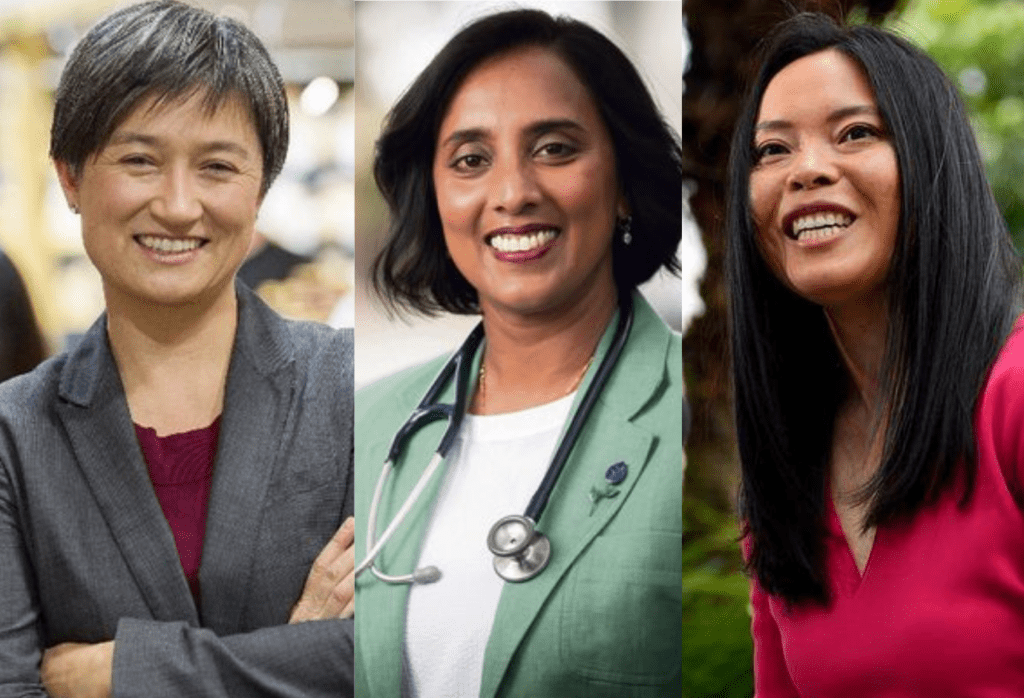Our new parliament will herald a record number of Asian-Australian women, with at least 8 Asian-Australians in total across both Lower and Upper Houses elected on Saturday.
They include incoming Labor MP for Reid, Sally Sitou, Independent Dai Le for Fowler, Labor MP for Higgins, Michelle Ananda-Rajah and Labor MP for Swan, Zaneta Mascarenhas.
In Australia, roughly 14.7 percent of the population are of Asian descent — similar to the percentage of African-Americans in the US .
According to the Australian Human Rights Commission, 21 per cent of Australians have a non-European background.
The confirmed number of Asian-Australian politicians in Federal Parliament has now risen to 5.3 percent, up from 3.3 per cent in 2019.
And while some were reelected to their seats, others are welcome newcomers.
In Melbourne’s inner south-east seat of Higgins for instance, an infectious diseases doctor who shot to fame during the COVID-19 pandemic made history.
Running for the ALP, Dr Michelle Ananda-Rajah became the first candidate to successfully challenge the seat of Higgins, which had been held by the Liberal Party since its creation in 1949 and held by two former prime ministers — John Gorton and Harold Holt.
Ananda-Rajah defeated Dr Katie Allen, a paediatrician, who retained the seat on a 2.6 per cent margin after the 2019 election.
Elsewhere, incoming Labor MP for Reid in NSW, Sally Sitou celebrated her victory on Sunday, telling reporters the win was a giant leap forward for the multicultural community and that their representation would strengthen the parliament.
“Asian-Australians want to see someone who represents them, and hopefully they see that,” she said. “You can dream big dreams, you are not defined by your postcode that you grew up in or the school that you went to or where your parents came from.”
Sitou, the child of Chinese Australian migrants, said her victory showed there “ought to be a place for people from different backgrounds in our parliament”.
In Victoria’s seat of Holt, Federal Labor candidate Cassandra Fernando won, succeeding long-serving Labor member Anthony Byrne with just under 57.5 per cent of the ‘two candidate preferred’ vote.
Fernando, who emigrated to Australia when she was eleven in 1999, becomes the first Sri-Lankan born woman in Parliament, taking on the seat Byrne has held since 1999.
And in Western Australia, arguably the most influential state of the election, Kalgoorlie-born Zaneta Mascarenhas became the first Goan-origin person to be elected to Australia’s lower house of representatives.
An engineer, Mascarenhas was elected as MP for Swan, defeating her Liberal opponent Kristy McSweeney.
The mother-of-two described her historic win as an “exciting moment.”
“I know that tonight, the people of Swan have made me the first female to be elected as a representative,” she said. “We believed in a better future.”
Mascarenhas emphasised her goals to tackle climate change and corruption in the Australian government.
In a qualification checklist she penned before Saturday’s win, she opened up about her parent’s journey to the nickel mining town of Kambalda in 1979.
“My parents and grandparents were born in Goa, which was a Portuguese colony at the time,” she wrote. “This meant that they were likely Portuguese citizens at birth. The Indian Citizenship Act does not allow dual citizenship and my parents became Australian citizens in 1979, as such they lost their Indian citizenship when they became Australian citizens.”
Not to be forgotten, Independent Dai Le won the south-western Sydney seat of Fowler which had been held by Labor since 1984. She defeated former Labor senator Kristina Keneally who suffered a 16.3 per cent swing against her.
The Labor party was criticised for its controversial move to parachute Keneally into the seat over local favourite Tu Le.
Dai Le said she believed Labor had been punished for its “arrogance”.
“The candidate was completely opposite to the values, and to the makeup of the electorate,” she said.
On Sunday, Tu Le, a Vietnamese Australian lawyer from western Sydney told the Guardian both major parties have learned an important lesson about listening to local communities.
“There’s obviously a lot of lessons to be learned here and I think all parties need to think twice about these decisions they make,” she said. “Overall I think it was a fantastic result for the ALP and it’s unfortunate what has occurred in Fowler.”
“But if this is what it takes for us to actually listen to local community voices then I think sometimes it is a lesson that has to be learned the hard way.”
“Ultimately I think the community benefits from that and really the community has won in this case because they made their voices heard very clearly and sent a clear message [that] you can’t take us for granted.”
Keneally’s loss in Fowler sparked backlash in the NSW Labor Party, with one senior MP revealing to the Guardian there was “no doubt” Tu Le would have snapped up the seat had she been selected.
“I think I would have had a high chance of winning it,” Tu Le said. “I think there is a good chance Dai Le would not have run if I was the candidate.”
“I don’t think it happens the same in any other similar democracy where you just have outsiders with absolutely no connection to the local community coming in and representing them. It should be a given.”
Reid representative Sitou agreed the party needed to “reflect” on their results in Fowler.
Sitou, along with these new Asian-Australian representatives, will join Greens Senator Mehreen Faruqi and ALP Senator Penny Wong in Parliament.
Wong, who is of Malaysian Chinese heritage, will now be the country’s Foreign Minister, and according to thought leader and policy advisor, Erin Wen Ai Chew, “will play a more consultative appointment in Australia’s relationship with China and have better engagement with Asia and the Pacific Islands.”
“No more “beating drums of war”, or whitesplaining away what Asia and the Pacific Islands needs,” she wrote in a Facebook post earlier this week.


